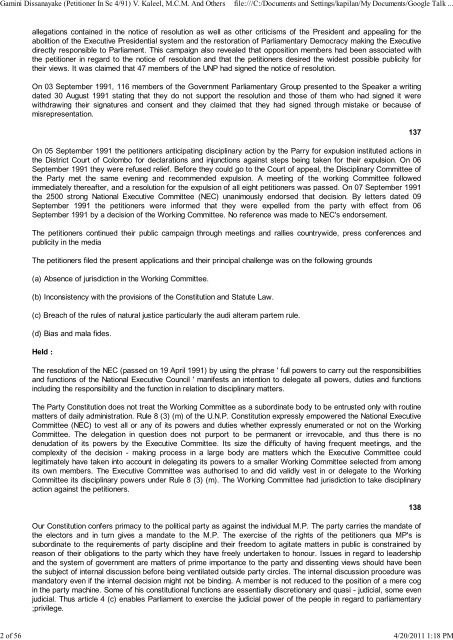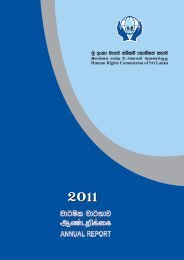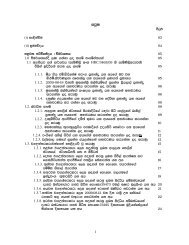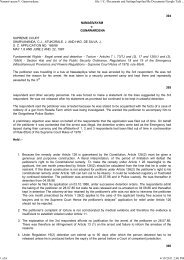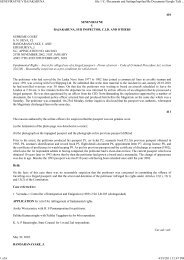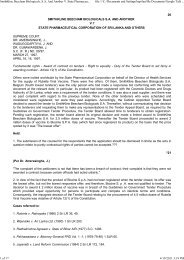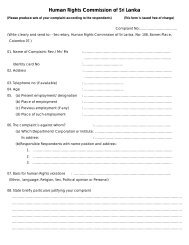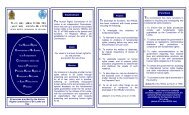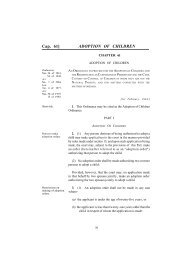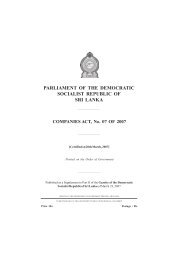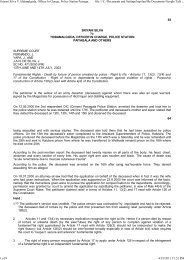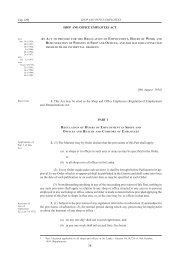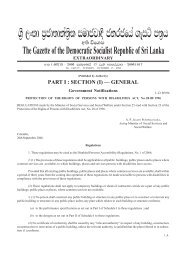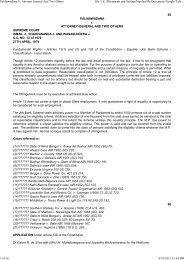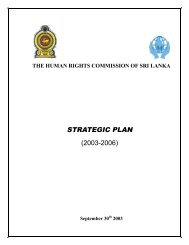Gamini Dissanayake (Petitio... - Human Rights Commission of Sri ...
Gamini Dissanayake (Petitio... - Human Rights Commission of Sri ...
Gamini Dissanayake (Petitio... - Human Rights Commission of Sri ...
You also want an ePaper? Increase the reach of your titles
YUMPU automatically turns print PDFs into web optimized ePapers that Google loves.
<strong>Gamini</strong> <strong>Dissanayake</strong> (<strong>Petitio</strong>ner In Sc 4/91) V. Kaleel, M.C.M. And Others file:///C:/Documents and Settings/kapilan/My Documents/Google Talk ...<br />
allegations contained in the notice <strong>of</strong> resolution as well as other criticisms <strong>of</strong> the President and appealing for the<br />
abolition <strong>of</strong> the Executive Presidential system and the restoration <strong>of</strong> Parliamentary Democracy making the Executive<br />
directly responsible to Parliament. This campaign also revealed that opposition members had been associated with<br />
the petitioner in regard to the notice <strong>of</strong> resolution and that the petitioners desired the widest possible publicity for<br />
their views. It was claimed that 47 members <strong>of</strong> the UNP had signed the notice <strong>of</strong> resolution.<br />
On 03 September 1991, 116 members <strong>of</strong> the Government Parliamentary Group presented to the Speaker a writing<br />
dated 30 August 1991 stating that they do not support the resolution and those <strong>of</strong> them who had signed it were<br />
withdrawing their signatures and consent and they claimed that they had signed through mistake or because <strong>of</strong><br />
misrepresentation.<br />
On 05 September 1991 the petitioners anticipating disciplinary action by the Parry for expulsion instituted actions in<br />
the District Court <strong>of</strong> Colombo for declarations and injunctions against steps being taken for their expulsion. On 06<br />
September 1991 they were refused relief. Before they could go to the Court <strong>of</strong> appeal, the Disciplinary Committee <strong>of</strong><br />
the Party met the same evening and recommended expulsion. A meeting <strong>of</strong> the working Committee followed<br />
immediately thereafter, and a resolution for the expulsion <strong>of</strong> all eight petitioners was passed. On 07 September 1991<br />
the 2500 strong National Executive Committee (NEC) unanimously endorsed that decision. By letters dated 09<br />
September 1991 the petitioners were informed that they were expelled from the party with effect from 06<br />
September 1991 by a decision <strong>of</strong> the Working Committee. No reference was made to NEC's endorsement.<br />
The petitioners continued their public campaign through meetings and rallies countrywide, press conferences and<br />
publicity in the media<br />
The petitioners filed the present applications and their principal challenge was on the following grounds<br />
(a) Absence <strong>of</strong> jurisdiction in the Working Committee.<br />
(b) Inconsistency with the provisions <strong>of</strong> the Constitution and Statute Law.<br />
(c) Breach <strong>of</strong> the rules <strong>of</strong> natural justice particularly the audi alteram partem rule.<br />
(d) Bias and mala fides.<br />
Held :<br />
The resolution <strong>of</strong> the NEC (passed on 19 April 1991) by using the phrase ' full powers to carry out the responsibilities<br />
and functions <strong>of</strong> the National Executive Council ' manifests an intention to delegate all powers, duties and functions<br />
including the responsibility and the function in relation to disciplinary matters.<br />
The Party Constitution does not treat the Working Committee as a subordinate body to be entrusted only with routine<br />
matters <strong>of</strong> daily administration. Rule 8 (3) (m) <strong>of</strong> the U.N.P. Constitution expressly empowered the National Executive<br />
Committee (NEC) to vest all or any <strong>of</strong> its powers and duties whether expressly enumerated or not on the Working<br />
Committee. The delegation in question does not purport to be permanent or irrevocable, and thus there is no<br />
denudation <strong>of</strong> its powers by the Executive Committee. Its size the difficulty <strong>of</strong> having frequent meetings, and the<br />
complexity <strong>of</strong> the decision - making process in a large body are matters which the Executive Committee could<br />
legitimately have taken into account in delegating its powers to a smaller Working Committee selected from among<br />
its own members. The Executive Committee was authorised to and did validly vest in or delegate to the Working<br />
Committee its disciplinary powers under Rule 8 (3) (m). The Working Committee had jurisdiction to take disciplinary<br />
action against the petitioners.<br />
Our Constitution confers primacy to the political party as against the individual M.P. The party carries the mandate <strong>of</strong><br />
the electors and in turn gives a mandate to the M.P. The exercise <strong>of</strong> the rights <strong>of</strong> the petitioners qua MP's is<br />
subordinate to the requirements <strong>of</strong> party discipline and their freedom to agitate matters in public is constrained by<br />
reason <strong>of</strong> their obligations to the party which they have freely undertaken to honour. Issues in regard to leadership<br />
and the system <strong>of</strong> government are matters <strong>of</strong> prime importance to the party and dissenting views should have been<br />
the subject <strong>of</strong> internal discussion before being ventilated outside party circles. The internal discussion procedure was<br />
mandatory even if the internal decision might not be binding. A member is not reduced to the position <strong>of</strong> a mere cog<br />
in the party machine. Some <strong>of</strong> his constitutional functions are essentially discretionary and quasi - judicial, some even<br />
judicial. Thus article 4 (c) enables Parliament to exercise the judicial power <strong>of</strong> the people in regard to parliamentary<br />
;privilege.<br />
2 <strong>of</strong> 56 4/20/2011 1:18 PM<br />
137<br />
138


